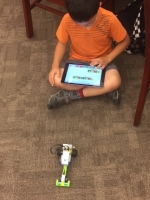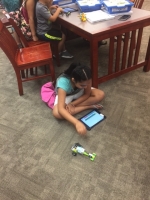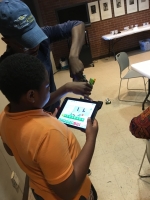Build-a-Bot – Lego Robotics Programs for Tweens
New Haven Free Public Library, Conn.
Innovation Synopsis
The Build-a-Bot program was a five-month, system-wide program for youth, teens and families. The program employed teens to lead programs for tweens teaching coding, problem-solving and creative design using LEGO WeDo kits. Weekly learning sessions for the tweens culminated in a monthly “Robot Rodeo” celebration for participants and their families.
Challenge/Opportunity
Build-a-Bot provided an introduction to STEAM concepts for tweens, including the skills to successfully write and execute computer coding programs. It offered the opportunity for family members to experience their children’s knowledge in action, reinforcing the idea that play leads to learning. Finally, it offered a unique job opportunity for New Haven teens through a competitive application process, providing professional experience to the teens selected and trained to lead the sessions and serve as mentors.
Key Elements of Innovation
Build-a-Bot introduced and strengthened STEAM concepts in participants and developed the problem-solving, modeling, prototyping, analyzing and interpreting data and computational thinking skills necessary to successfully build and operate a robot. Participants shared robotics kits, strengthening social skills, teamwork and delegation of responsibility. The operation of the completed robots, using Bluetooth-enabled devices and WeDo software, increased participants’ familiarity and comfort with technology. Furthermore, the program employed teens to lead the sessions, developing leadership and professional skills.
Achieved Outcomes
Build-a-Bot stimulated intergenerational learning across socio-economic sectors, attracting nearly 300 tweens in weekly sessions and over 50 participants in the culminating monthly “Robot Rodeos.” It provided access to robotics technology at each library branch that was not otherwise available to children in their homes or school. Finally, NHFPL is replicating the successful model of teens as mentors to children in other makerspace programs in the library and local citywide digital camps.



